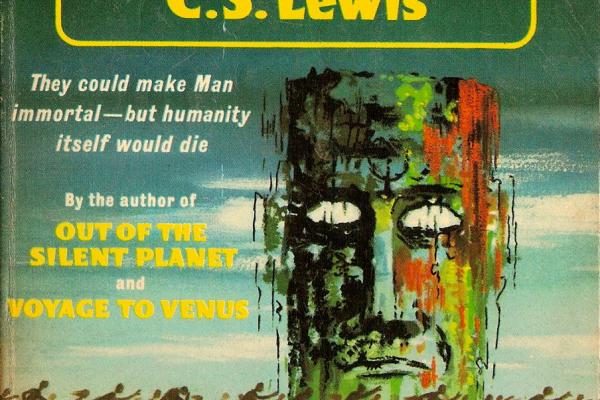Happy Star Wars week! This piece is part of a series on God in sci-fi and fantasy. Read the other entries here.
We will be immortal.
Not in heaven, or in the resurrection life of the New Creation. On this earth, in these bodies.
That’s the promise of the transhumanists, at least. If you’ve never heard of it, transhumanism is a movement that seeks to lift humans to an entirely new stage of development through things like cryonics, space travel, life extension therapies, and human modification technology.
In a letter to the editor of the January edition of First Things, the transhumanist Steve Fuller outlines two sides of the movement. In the quest for immortality, the transhumanists would have us either “live in the biological bodies of our birth indefinitely, either by reversing the aging process or, per cryonics, resurrecting the dead,” or have us “migrate from a carbon to a silicon base, such that we merge with ‘artificial intelligence,’ perhaps culminating in the ‘Singularity.’”
While this may sound ridiculous, Steve Fuller is not some crazy guy who lives in his basement just watching sci-fi movies. He’s a professor of sociology in England, at the University of Warwick.
Which is where C.S. Lewis comes in.
In Lewis’ That Hideous Strength, the third novel in his Space Trilogy, a group of genteel English professors create the National Institute for Co-ordinated Experiments, or the N.I.C.E. When explaining the N.I.C.E. to protagonist Mark Studdock, Lord Feverstone prophesies:
“It does really look as if we now had the power to dig ourselves in as a species for a pretty staggering period, to take control of our own destiny. If Science is really given a free hand it can now take over the human race and re-condition it: make man a really efficient animal. If it doesn’t — well, we’re done.”
The N.I.C.E.’s goals sound similar to those of the transhumanists: re-condition, make efficient, control. Granted, futurist thinkers in Lewis’ day were already laying the foundations for modern transhumanism. But back then, they didn’t have anything like the technology available now to those who want to reprogram humanity.
Things do not end well for the N.I.C.E. Their quest for power seems well-intentioned — progress is good, right? — but they elevate that quest above any moral constraint. The N.I.C.E. doesn’t hesitate to kidnap and imprison Studdock when he tries to desert, and the Institute even provokes a riot in order to declare martial law over the nearby town, enforced by their private police.
They’re a deeply disturbing bunch. But at least they’re fictional. And the real transhumanists, like Steve Fuller, wouldn’t endorse kidnapping fellow professors or provoking a riot in Coventry.
But I’m worried about professors from England, and others, wanting to enhance human development for the same reason Lewis was: their optimism.
Maybe this sounds strange — why would anyone think optimism is dangerous? And don’t all activists believe that the world will get better? After all, Dr. Martin Luther King Jr. once said, “The arc of the moral universe is long, but it bends towards justice.” We believe that things will turn out alright in the end.
But Dr. King’s “optimism,” if you can really even call it that, rested on the belief that the world has moral foundations, that God’s justice will triumph in the end. This vision of ultimate divine authority is a world away from the optimism at the foundation of transhumanism and the N.I.C.E.
For transhumanists, longer life for humans, more technology, and increased power will certainly end well. Even Christian transhumanists, like the Silicon Valley icon Peter Thiel, couch the movement in biblical language. Recalling Jesus conquering death, he said, “I think the thing that’s really incompatible with life is death.”
But the transhumanists don’t take into account the reason death exists, and this is especially jarring when listening to Christian transhumanists like Thiel. In Genesis, death isn’t a glitch in the operating system that God engineered. Rather, death is the result of Adam and Eve’s choice — one to take control of their own destiny, their lack of trust in God’s promise of loving care. When we take control, we compare and compete with each other, instead of trusting and loving each other. After all, the first sin committed after Adam and Eve eat the forbidden fruit is when Cain kills Abel.
This reading of the Fall narrative helps me read Paul’s words in Romans 6:23 in a new light. When he says, “For the wages of sin is death,” he isn’t threatening us. Rather, Paul’s words convey an anguished realization that we cannot save ourselves, no matter what we do, no matter how advanced our life extension therapies.
The problem with transhumanism — and with the unfettered quest for technological innovation more generally — is identified in Lewis’ book The Abolition of Man, which he called the nonfiction counterpart to That Hideous Strength.
“What we call Man’s power over Nature turns out to be a power exercised by some men over other men with Nature as its instrument,” he writes.
Take the airplane. Flying in a plane does not actually give me power over nature. The plane’s pilot is the one allowing me to fly in the plane, and thus the pilot has a certain power over me. That has worked out pretty well in my case, but not so well for the millions of humans who have died because other people used their planes as weapons.
That may sound extreme, but you need only think of another great advance to find another great sin. The mechanized loom was supposed to help humanity conquer the inefficiency of hand weaving. It did, and as a consequence, during the Industrial Revolution we built the “dark, satanic mills,” of William Blake’s imagination. Two hundred years later, we still have sweatshops filled with child laborers all over the world.
Technology itself may be inherently amoral. But technology is always a tool in the hands of humans, who are inherently immoral. That’s the whole reason Christians cannot pay attention only to private piety. If we leave society to its own devices, concrete gets used for the foundations of more jails instead of more schools, GPS gets used for drone strikes instead of pizza deliveries, and the internet gets used to coordinate terrorist attacks instead of coordinating Christmas parties.
Lewis calls us to caution, to humility in the face of our quest for power. Just because we can does not mean we should. Even if you’re an optimistic transhumanist professor in England.
That Hideous Strength is a devastating picture of that danger, more than fifty years ahead of its time.
Got something to say about what you're reading? We value your feedback!

